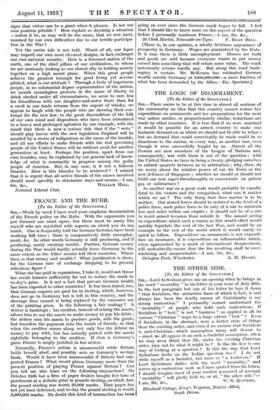THE LOGIC OF DISARMAMENT.
[To the Editor of the SPECTATOR.] Sin,—There seems to be at this time in almost all sections of the community an idea that this country cannot reduce her expenditure on armaments and her preparations for the next war unless similar, or proportionately similar, reductions are made by other countries. It is true that if we were unarmed it would be possible for an armed country to make any fantastic demand on us which we should not be able to refuse ; but no demand that could conceivably be made could be so disastrous to the nation, in every way, as another war, even though it were successfully fought by us. Almost all the Powers are now members of the League of Nations and, consequently, war with them is out of the question ; with the United States we have in being a treaty, pledging ourselves to submit quarrels between us to arbitration ; why, then, do we worry about the relative power of our Air Force or the new defences of Singapore ; whether we should or should not build our new super-Dreadnoughts or concentrate on poison gas or submarines ?
As another war on a great scale would probably be equally fatal to the victors and the vanquished, what can it matter which we are ? The only thing that does matter is to be neither. Our armed forces should be reduted to the level of a police force, such police force to be only of a size to maintain law and order within our empire ; it should not be of a size to resist armed invasion from outside it. The annual saving in expenditure which such a course as this would effect would quickly liquidate the cost of the last War, and would be an example to the rest of the world which it would surely be quick to follow. Expenditure on armaments is not expendi- ture on insurance, it is expenditure on inflammables which, when approached by a spark of international disagreement, will undoubtedly ensure that the fire resulting shall be over- whelming and unquenchable.—I am, Sir, &c.,


































 Previous page
Previous page